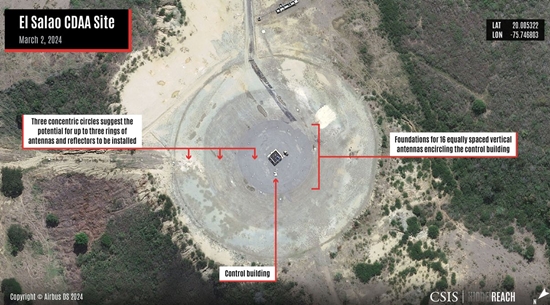
“If China is thinking about a potential confrontation with the United States, it needs to learn about the facilities, the way the U.S. operates in the region. And signal intelligence facilities are one of the best ways of doing that,” says Matthew Funaiole, author of a new CSIS report, “Secret Signals: Decoding China’s Intelligence Activities in Cuba.”
We’ve known about China’s Cuba-based spying for a while.
The CSIS investigation “follows reporting last year by The Wall Street Journal that China and Cuba were negotiating closer defense and intelligence ties, including establishing a new joint military training facility on the island and an eavesdropping facility,” observes the Journal’s Warren Strobel (“Satellite Images Show Expansion of Suspected Chinese Spy Bases in Cuba,” July 2, 2024).
At the time, the Journal reported that Cuba and China were already jointly operating eavesdropping stations on the island, according to U.S. officials, who didn’t disclose their locations. It couldn’t be determined which, if any, of those are included in the sites covered by the CSIS report.
The concern about the stations, former officials and analysts say, is that China is using Cuba’s geographical proximity to the southeastern U.S. to scoop up sensitive electronic communications from American military bases, space-launch facilities, and military and commercial shipping.
Chinese facilities on the island “could also bolster China’s use of telecommunications networks to spy on U.S. citizens,” said Leland Lazarus, an expert on China-Latin America relations at Florida International University.
The White House and the Office of the Director of National Intelligence declined to comment.
Authors of the CSIS report, after analyzing years’ worth of satellite imagery, found that Cuba has significantly upgraded and expanded its electronic spying facilities in recent years and pinpointed four sites—at Bejucal, El Salao, Wajay and Calabazar….
In its annual threat assessment released in February, the U.S. intelligence community said publicly for the first time that China is pursuing military facilities in Cuba, without providing details.
At the Wall Street Journal website, readers disagree about the import of China’s Cuba setup and what the U.S. should do about it. “If only we had a commander-in-chief,” one laments. Another proposes that the U.S. government “just send troops in and liberate this island.” A third, bringing all powers of analysis to bear, advises that our government “just ignore the activity…. Get used to it, spying never changes….”
Whatever the U.S. government should do about the threat of China, to “just ignore” it is tantamount to just surrendering.
Also see:
CSIS.org: “Secret Signals: Decoding China’s Intelligence Activities in Cuba”
“Collecting data on activities like military exercises, missile tests, rocket launches, and submarine maneuvers would allow China to develop a more sophisticated picture of U.S. military practices. While modern military communications are highly encrypted—meaning the contents of the messages and data are hidden—information on the frequency, origin, direction, and pace of communications traffic can provide significant intelligence value.”





